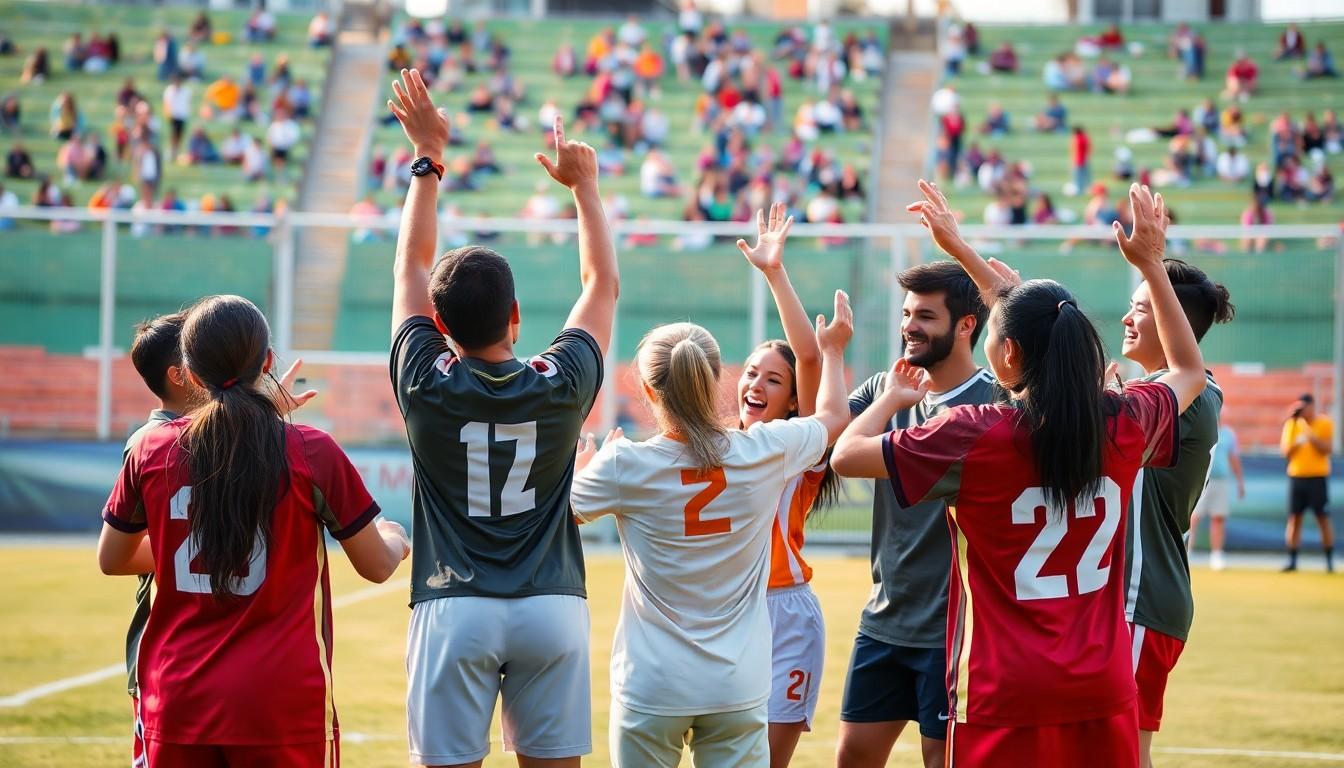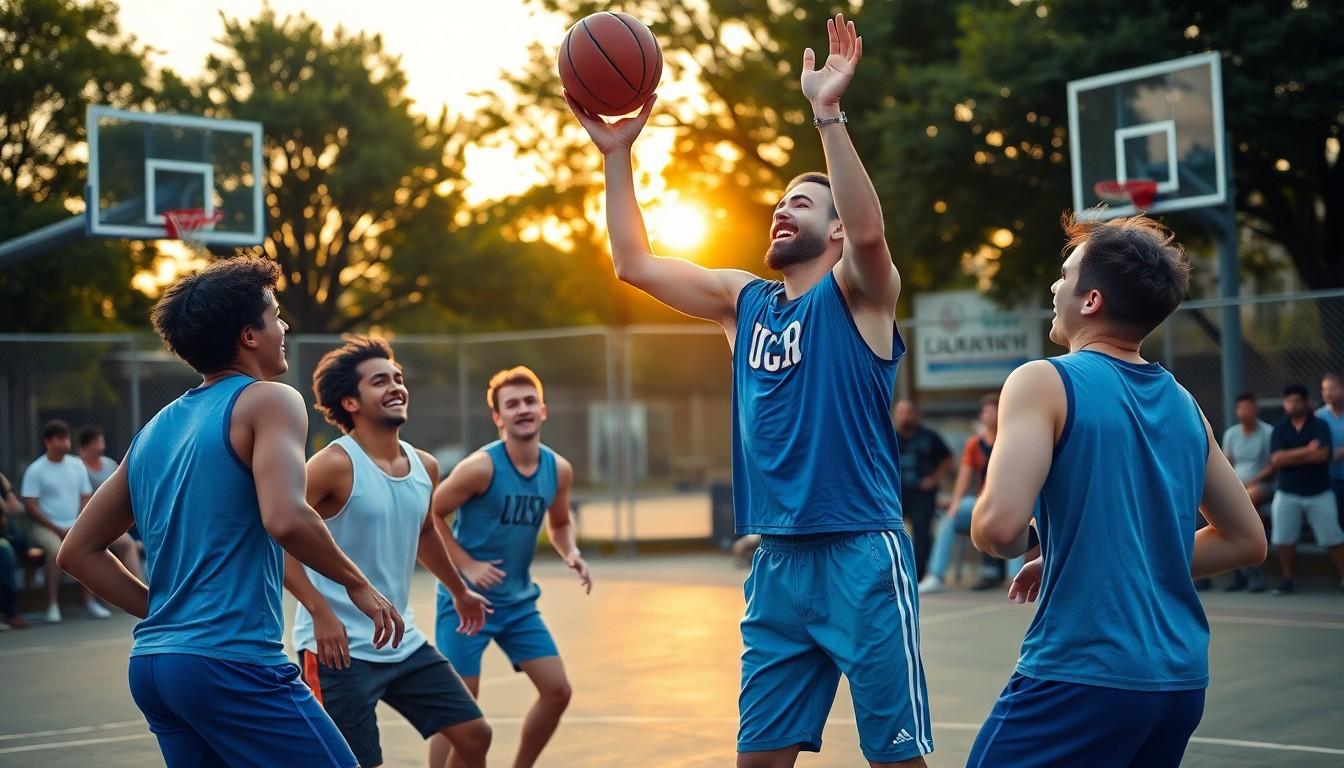In the world of competitive team games, camaraderie and rivalry collide in the most exhilarating ways. Picture this: a group of friends huddled together, strategizing their next move while trying not to trip over each other’s shoelaces. It’s a chaotic symphony of laughter, tension, and the occasional friendly shove as everyone vies for victory.
Competitive Team Games
Competitive team games play a crucial role in fostering social dynamics. Players engage in collaborative efforts to outsmart their opponents while maintaining a sense of teamwork. Such games enhance skills like communication, strategy, and problem-solving.
Many popular sports exemplify this competitive spirit. Soccer, basketball, and volleyball represent traditional team games, each requiring coordination and strategy. In soccer, for example, teamwork revolves around passing and positioning to score goals. Basketball emphasizes quick thinking and synergy to dominate the court. Meanwhile, volleyball requires precise coordination among teammates for successful serves and blocks.
Non-traditional games also attract interest. Esports, such as League of Legends and Overwatch, include teams strategizing in virtual environments. Team dynamics often mirror those seen in physical sports. As player roles differ, collaboration becomes essential for victory.
Competitive team games build strong bonds among participants. Shared experiences in high-pressure situations foster camaraderie. Players often reflect on their teamwork long after the match concludes, deepening friendships.
Different age groups can enjoy these games. Youth leagues offer structured settings for skill development, while adult leagues provide recreational outlets. Competitive team games also vary in format, from structured tournaments to casual pick-up games. Nonetheless, the underlying principles of teamwork and competition remain constant throughout.
Overall, competitive team games serve not only as an outlet for physical activity but also as platforms for growth and connection. The combination of rivalry and collaboration creates memorable experiences, making these games integral to social life.
Popular Types of Competitive Team Games

Competitive team games come in various forms, each offering unique experiences and challenges. Two prominent categories include traditional sports and e-sports.
Traditional Sports
Traditional sports represent a classic form of competitive team games. Soccer features teams battling on the field, promoting coordination and strategic play. Basketball encourages fast-paced teamwork, requiring players to communicate effectively during dynamic plays. Volleyball emphasizes both offense and defense, with players relying on quick reflexes and collaboration. These sports not only engage participants but also foster community spirit through local, regional, and national competitions. Youth leagues enhance skills in a fun environment, while adult recreational leagues offer a chance for social interaction and physical fitness.
E-Sports
E-sports have gained immense popularity, showcasing competitive play in a digital landscape. Teams compete in games like League of Legends and Counter-Strike, requiring strategic planning and real-time decision-making. Collaboration among teammates is crucial, as players must coordinate their actions to achieve victory. Tournaments attract massive audiences, both online and in-person, creating a sense of community among fans. E-sports promote teamwork and communication, similar to traditional sports, making them appealing to various demographics. Additionally, educational institutions are beginning to recognize the importance of e-sports, with many offering scholarships for talented players.
Benefits of Participating in Competitive Team Games
Participating in competitive team games delivers numerous advantages that extend beyond the playing field. These benefits encompass various aspects of life, including physical health, social skills, and mental toughness.
Physical Health
Engaging in competitive team games boosts overall fitness. Players develop improved cardiovascular health, increased strength, and enhanced flexibility through consistent practice and competition. Positive impacts on metabolic rates derive from regular physical activity, promoting healthier lifestyles. Participation in traditional sports, like soccer and basketball, often leads to weight management and improved muscle tone. Furthermore, consistent involvement in team games reduces stress levels, contributing to better mental health. The combination of aerobic exercise and teamwork fosters endurance, enabling players to perform better in various physical challenges.
Social Skills
Joining competitive teams cultivates essential social skills. Communication improves as players strategize and collaborate during games. Team members learn how to convey ideas clearly, ensuring everyone is on the same page. Respect for others develops through shared experiences and navigating competitive situations. Additionally, handling wins and losses fosters good sportsmanship, teaching individuals to celebrate achievements while embracing humility. Players often form lasting friendships based on shared goals and common interests. Interacting with diverse teammates enhances cultural awareness and empathy, further enriching their social experiences beyond the game.
Mental Toughness
Competitive team games enhance mental toughness significantly. Players encounter challenges that require resilience and focus, crucial attributes for success both in and out of the game. Facing high-pressure situations, such as tight scores or critical plays, teaches players to stay calm and adapt quickly. Commitment to a team instills discipline, emphasizing the importance of practice and preparation. Athletes often develop a growth mindset, viewing failures as opportunities for improvement. As a result, individuals gain confidence in their abilities, empowering them to tackle future challenges. This mental fortitude translates into various aspects of life, promoting better decision-making and perseverance.
The Role of Strategy in Competitive Team Games
Strategy plays a crucial role in competitive team games. Effective team dynamics enhance collaboration and performance. Players must understand each other’s strengths and weaknesses to optimize their collective potential. Adaptable strategies become essential during high-pressure situations.
Team Dynamics
Team dynamics influence success in competitive games. Trust between teammates fosters open communication. Roles are clearly defined to enhance efficiency, allowing individuals to concentrate on specific tasks. Positive relationships among players boost morale, increasing overall team performance. Furthermore, understanding group dynamics helps teams adapt and respond to opponents’ tactics.
Leadership and Communication
Leadership shapes team strategy directly. Strong leaders establish clear goals, motivating teammates to strive for excellence. They also facilitate effective communication by ensuring everyone feels heard. Regular check-ins enhance unity and cohesion among players. Leaders encourage adaptability, promoting a culture where constructive feedback is welcomed. Open dialogue ensures that strategies are continuously refined, leading to improved execution during games.
More Than Just a Chance To Win
Competitive team games offer more than just a chance to win; they create lasting bonds and unforgettable memories. Through shared challenges and triumphs, players forge friendships that extend beyond the game. The skills developed in these environments—communication, strategy, and resilience—prove invaluable in everyday life.
Whether on the field or in the digital arena, the essence of teamwork remains a powerful force. As individuals engage in these games, they not only enhance their physical and mental well-being but also contribute to a vibrant community spirit. Embracing the competitive spirit in a supportive atmosphere cultivates personal growth and a sense of belonging, making competitive team games a vital part of social engagement.




